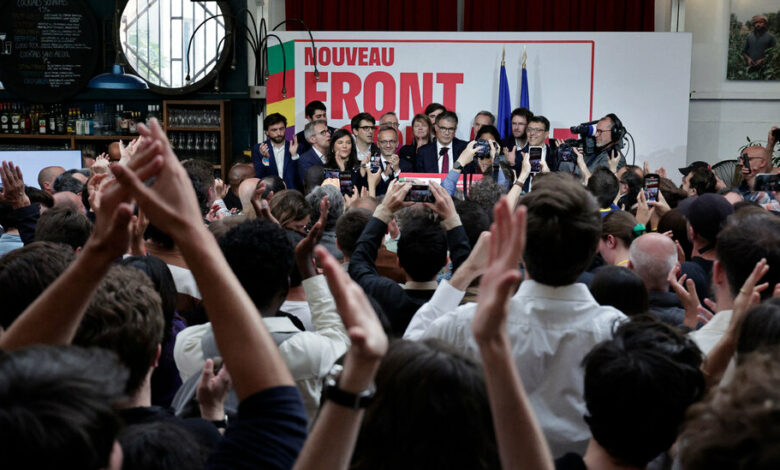The left united to keep the far right out of power. The strategy seemed to work.

As votes were still being counted across France on Sunday evening, one thing was clear: the left-wing coalition known as the New Popular Front performed much better than expected, preventing the far right from achieving victory.
Forecasts show the coalition emerging victorious, winning dozens of seats. That’s an achievement for an alliance formed only last month with the goal of keeping the far-right Rassemblement National out of power.
The alliance consists of four left-wing parties: Communists, Socialists, Greens and the far-left party France Unbowed. While many in France cheered what appeared to be a defeat for the far-right, others feared what the far-left might bring.
Last week, after the first vote in a two-round election, the coalition withdrew more than 130 of its candidates from three races where the far right had a chance of winning, urging its supporters to vote strategically against far-right candidates.
It seemed like the strategy was working.
Despite the apparent victory for the left, polls showed that no party or alliance won an outright majority, making it likely that a government would be formed.
Yet France Unbowed founder Jean-Luc Mélenchon, a combative and divisive figure, quickly declared that his party was unwilling to negotiate to form a coalition government. Instead, he demanded that the left-wing alliance be given the reins of government so that it could implement its “whole program.”
Socialist Party leader Olivier Faure also said the alliance would not negotiate the formation of a coalition government.
“That would betray the voice of the French people and extend the Macronist programme,” he said.
Some voters see France Unbowed, whose members have been accused of anti-Semitism, as at least as dangerous as the far right. And some economists worry about the alliance’s spending plans at a time when France is already mired in debt.
The far-left’s proposed platform includes raising France’s minimum wage, lowering the legal retirement age from 64 to 60, building one million new affordable homes in five years, and freezing the prices of basic necessities including food, energy and gas. The state would also pay households all costs related to their children’s education, including cafeteria meals, transportation and extracurricular activities.
Instead of drastically restricting immigration, as the far right had promised, the coalition promised to make the asylum procedure more generous and flexible.
The New Popular Front has promised to raise the tens of billions of euros needed to fund its programs by raising taxes on wealthy individuals.
“It’s time to tax the super-rich and the super-profitable,” Mr Faure said on Sunday evening to cheers.
If President Emmanuel Macron were to task him with forming a government, it is still unclear which of the coalition leaders would become prime minister.
During the hectic four-week election campaign, the leaders of three of the four parties insisted they would not be led by Mr Mélenchon..
As attacks and threats against French Jews increase, Mr Mélenchon has been repeatedly accused of stoking anti-Semitism.
His fiery political approach and unwavering pro-Palestinian stance after the October 7 attack on Israel were largely responsible for the four groups’ disintegration last year, after months of tense relations over other issues.
Mr. Mélenchon has refused to call Hamas a terrorist organization and has vehemently condemned Israel’s military operation in Gaza as “genocide.” He also called a large demonstration against anti-Semitism, attended by two former French presidents, a rendezvous for “the friends of the unconditional support for the massacre.”




